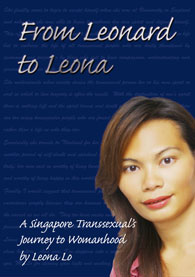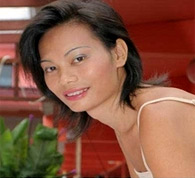Leona Lo is a woman of contradictions. Ten years ago, she became a woman through sex-change surgery: today she resists feminine stereotypes, revelling in her hobbies of swimming and windsurfing. While she expresses disgust with most organised Christianity, she nonetheless spiritually identifies as a Catholic convert, greatly inspired by the writings of the Jesuit priest Anthony de Mello. And while she says she's not an activist, she remains one of the Singapore transsexual community's most public faces, regularly writing, speaking and blogging on transgender issues.

To me, however, the biggest surprise is that this beautiful, confident woman could be same person who wrote and lived through the experiences of her memoir, From Leonard to Leona: A Singapore Transsexual's Journey to Womanhood. Written over a course of 11 years, the book is a harrowingly intimate account of growing up in Singapore in the '80s and '90s, unflinchingly describing the shame and trauma of being a woman trapped in the awkward body of a boy.
Born under the name of Leonard, the author was both mocked as a sissy and praised as an intelligent child - a combination that bred intense levels of emotional pressure within a working-class family with bourgeois dreams. Her youth seems filled with endless stories of pain: young Leonard was fostered out to his grandparents, molested by his uncle, taunted in school and the army, driven to the point of suicide on multiple occasions, placed in a psychiatric ward and even charged by the military for his attempt to kill himself. Even gender reassignment surgery failed to offer immediate happiness: as Leona, the author still suffered, betrayed by men, crushed by her own emotional vulnerability.
It's rare for an autobiography in Singapore to contain such brutal frankness about the ugliness of our country. Leona paints an unglamourised vision of the landscape of our childhoods, complete with ugly school uniforms, superstition, class divides, homophobia and violent crime - her anecdotes of meeting prostitutes at Changi Village are almost the least sordid element of the book. She's particularly searing in her portrayal of her immediate and extended family, with all their internal feuding, hypocrisy and abuse - things that lurk in all families, but which few of us would dare to publish. (Leona notes that she has since reconciled herself with her parents, with whom she now lives with little tension save for regular "mother-daughter bickering." She did not, however, ask their permission to publish her story.)
Admittedly, this book is more than a little overfull with angst and drama, at times coming across as juvenile in its posturings. One gets a tad cynical reading the author's dismissive aphorisms on the whole of Singapore society, as well as her italicised descriptions of her childhood fantasies, imagining herself a fairytale princess waiting for her prince. Still, this sense of naiv�t� is understandable, given that much of the book was written in the author's troubled university years - plus, it's this very voice of honesty that allows Leona to describe her own devastating twistedness as a young boy: as she tells us on the very first page, "I was resolved at the age of 10 to have a whore's body and to be made love to like a woman."
In the last few chapters of the text, we read accounts of how the author began to find solace from unexpected quarters: in the Catholic community of York University, in the writings of the leaders of the American civil rights movement, in windsurfing. But ultimately, like the cover photo, the book's ending doesn't do the subject justice. To fully grasp the power of Leona's journey, one has to witness not only her odyssey of angst, but also the full extent of healing and growth that have taken place afterwards.
It's only in conversation that one discovers who Leona is today: a strong and charismatic woman, happily single, even considering adopting children as a single mother. She's also proud to boast that due to her muscular development from windsurfing, she has no need to wear breast implants.
From Leonard to Leona remains a powerful book for its description of a turbulent queer coming of age in Singapore. But to know the real Leona, one has to meet her in the flesh.
From Leonard to Leona: A Singapore Transsexual's Journey to Womanhoodis available from Kinokuniya, Borders and Select Books in Singapore. It is also available online www.fridae.asia/shop (international shipping available.)
Next page: Leona in her own words
æ:Age, sex, location?
Leona: 32, female, Singapore.

Leona: I was with the (Singapore) Health Promotion Board as a Corporate Affairs Manager. After that I was with Hill and Knowlton, the public relations company. And then I came out and started my own business, Talk Sense; we do a lot of communications work on health care and beauty products, but I'm branching out into other things - I just brought in hand-painted copper earrings from Turkey; I call the range "Ottoman Dreams".
æ: And you were out as a transsexual person when you held these jobs?
Leona: Mm-hmm. I've always been notoriously, evidently transsexual, everywhere.
æ: Tell me about From Leonard to Leona. When did you start writing?
Leona: It's been like a diary. I started writing it in my head many years ago, in school, and I was 21 in university when I put pen to paper. I've been writing it on and off since then - as I accumulated experiences, the more I wrote, and the style just evolves with each chapter. So if it comes across as na�ve and stupid, that's really the way I was back then.
æ: It actually comes across as really intimate - scarily honest, even. How did get the guts to write something like this?
Leona: I've always been the kind of person who wears her heart on her sleeve. When I'm angry I yell; when I'm upset I cry, but once I'm done crying I move on. That's why I'm so open about my life experiences. I think it's to do with how I was so repressed as a child. Everyone repressed me; repressed my voice, repressed who I was. I don't want to live that life anymore.
æ: Do you see yourself as a transgender activist?
Leona: Not at all! I don't do anything except for my writing, speaking to the international press and going into schools and universities to give the occasional talk. I don't have time for more active work - I'm running my business, I'm doing my windsurfing, I'm travelling. I think a lot of people are coming out right now, with groups like Sgbutterly, and I will be redundant in time to come, really. Leona Lo is pass�
æ: But you're an icon in Singapore - people need a transsexual role model.
Leona: It's so terrifying, though! I just want to sell my earrings. (laughs) But sure, I'd love to participate in IndigNation [Singapore's Queer Pride Festival] next year.
æ: Do you think there's a lot of transphobia in this country?
Leona: I haven't encountered much. Singapore is okay, workwise. I socialise on an everyday basis with straight men and I don't see any kind of averse or negative reaction. Some people ask stupid questions but at least these days most people don't have the assumption that all transsexuals are prostitutes. I think we've come very far.
But of course, young transsexuals are still being treated horrendously by parents and their friends. I think young transsexuals should receive gender counselling from the age of 12, or else they'll grow up with a lot of emotional problems, just like I did. I would love to go back to Catholic High and Hwa Chong and talk about it, how we can help young transsexuals achieve their dreams.
æ: Why should the average reader of Fridae - a non-transsexual - care about transsexual issues?
Leona: Because it's a human condition. One in every 2,500 born males is a transsexual. You may already have a friend or relative who's a transsexual. So we do need to talk about it, we need to reach a wider audience, we need to help parents help their children cope.
The (Singapore) Health Ministry is not doing enough - it should give pre-operative counselling rather than throwing young transsexuals into the ocean and saying, "Just swim." We need counselling services, we need hotlines, we need trained staff. Which is why I set up my own business, because I want to set up this thing myself and I need money.
æ: What advice do you have for any reader who might be considering gender reassignment surgery?
Leona: Before your operation, think of the kind of woman you want to be. I find you're very beautiful when you don't change yourself too much externally.
And it would be good to get a piece of paper and write down your dreams of what you want to achieve after the surgery, like "I want to be a great gymnast". Do not write down, "I want to be happily married," because that cannot be your ultimate aim - after the initial euphoria of the sex change, you have to stand for something.
æ: Is there anything else you'd like to add?
Leona: I would like civil servants to stop abusing the term Asian values, because which country in Asia are you referring to? Singapore was one of the first countries to grant transsexuals legal recognition of their new status, ahead of the UK - and now Japan has its first transsexual MP, Korea has Harisu, China has got [dancer] Jing Xing - China has got lots of successful transsexual women. For some reason Hong Kong is the worst when it comes to the treatment of minorities. And Kuan Yin is a transsexual goddess!
I always stress this when I give talks: transsexuals have always had a place in society and history. In Ancient Greece, we were priestesses; in native American culture, we took on husbands and adopted children; the Prophet Mohammed himself used eunuchs to guard the harems and tombs. How dare anyone say we are a 21st century phenomenon? Only the sex-change operation is new.
But along the way, religion has taken away our heritage, our ancestry; has twisted us into something ugly. We had a history, we had a past, we had an identity, but people took that away from us.
Leona Lo runs a website at www.leonalo.com as well as a blog at www.wo-manly.blogspot.com.
